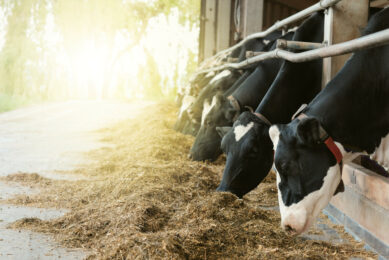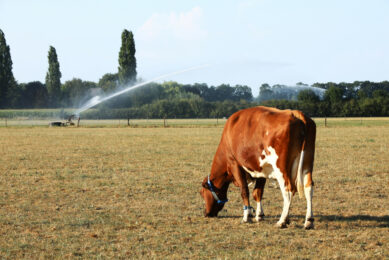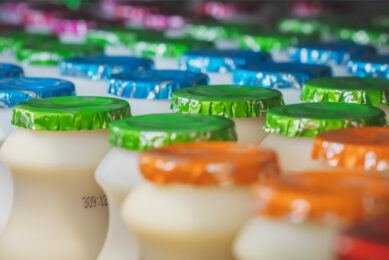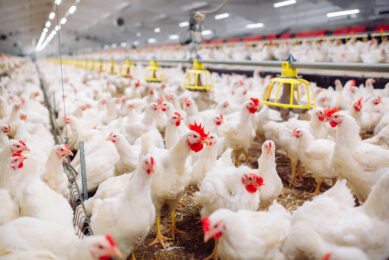Save your income from going up in smoke
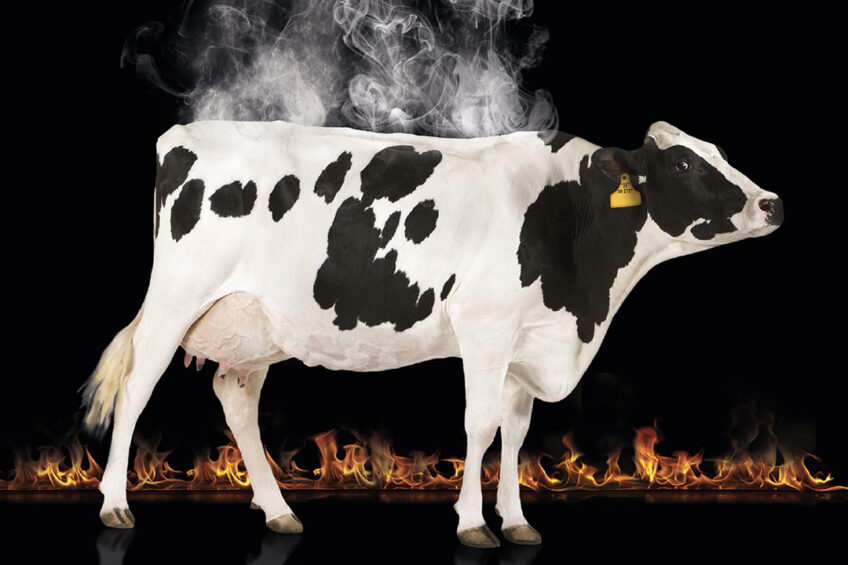
The impact of yeast-based solutions on the hugely damaging effect of heat stress in farm livestock has shown highly promising results in product trials with cattle, pigs and poultry. Here some results are highlighted.
Specialist yeast solutions for combating heat stress in cattle, pigs and poultry have been developed by Phileo Lesaffre Animal Care. These are helping treated stock maintain growth and productivity in the face of heat stress conditions which might otherwise inflict both short and long-term damage on the health and performance of the animals concerned. Results are highlighted here per species.

Cattle
Heat stress is especially problematic in dairy herds which are operating at the top of the production league. It affects feed intake, cow body temperature, maintenance requirements, metabolic processes, feed efficiency, milk yield, reproductive efficiency, cow behaviour and disease incidence. To combat such problems, Phileo has focused on the development of a range of yeast-based nutritional solutions, drawing on three specialist products from within its portfolio.
Figure 1 – Milk yield under heat stress.
- The first, Actisaf, is a live yeast which acts as a probiotic and has been shown, across many studies, to deliver significant improvements in rumen function. It has also been found to help improve fibre digestion and rumen stabilisation in heat-stressed dairy cows, alongside a reduction in the respiratory rate of treated animals, leading to increased milk and milk solids production in comparison to non-treated cows (Figure 1).
- The second product is Safmannan, a premium yeast parietal fraction which, when fed alongside Actisaf, triggered a supportive immune response in heat stressed cows. Feeding the two products together in trials carried out on eight Dutch dairy farms, also produced a beneficial impact on somatic cell count (SCC) levels, which were reduced from a control group average of 280,000 per farm to a treatment group figure of less than 200,000.
- The third product, Selsaf, is a selenium-enriched yeast which has been tested for its effectiveness as an anti-oxidant. This targets typical stress causes, such as diet, transportation and heat, which can be traced to an upsetting of the balance between the pro-oxidant and anti-oxidant systems of affected animals. Trialled with heat stressed cows, the product delivered a significant reduction in rectal temperature (38.6°C vs. 38.9°C) and respiratory rate (56.6 breaths/min vs. 62.4). It also helped produce lower SCC numbers (207,900 /mL vs. 378,500 /mL). In addition, the use of the selenium-enriched yeast led to a significant increase in the selenium content of milk (34.67 µg/L vs. 26.79 µg/L) and raised the active presence of the major antioxidant enzyme, glutathione peroxidase (182.5 U/mL vs. 159.1 U/mL).
Pigs
Feeding live yeast to pigs in trials, run in China and Mexico, proved to be beneficial in easing the impact of heat stress in both lactating sows and piglets. During the Mexican trial, live yeast was added to the lactating diet of piglets during their first 21 days, resulting in improvements in feed intake in the second half of the lactation with increased weights being achieved at weaning. The trial was based on piglets, drawn from a total of 12 litters. Control piglets from these litters advanced from a birth weight of 1.43kg to a 21-day weight of 5.90kg. Piglets fed a live yeast supplement, meanwhile, grew from 1.44kg to 6.50kg during the same 21 days.
Analysing the Mexican results, Phileo observed that the transfer of antibodies from sows to piglets was higher in the live yeast groups, with the sows concerned achieving higher milk production, a higher concentration of colostrum and greater efficiency in transferring immunity to their piglets.
The Chinese trial, meanwhile, focused attention on how feeding the live yeast product, Actisaf, affected farrowing times and piglet survival rates. The average farrowing duration for sows, when kept at a temperature of 23°C, was 4 hours 54 minutes. This increased to 5h 37m for an untreated control group of sows when the temperature climbed to 32°C. However, sows given the live yeast product when the temperate reached 32°C had a farrowing duration time of 5h 05m, half-an-hour less than the control group, a factor which helped maintain piglet survival rates under heat stress. Sows given the product during lactation also maintained better condition than the control group, enabling them to increase productivity throughout the lactation period. As a result, back fat loss by lactating sows when the temperature reached 32°C was significantly less in the Actisaf group (-0.8mm) than with the control sows (-1.8mm).
Poultry
For poultry, the use of Phileo’s premium yeast fraction, Safmannan, with broilers under heat stress conditions, resulted in reduced heat stress effects, alongside improvements in zootechnical performance. Tested across a range of heat stress trials, the product delivered positive improvements in survival rates, alongside better growth and feed efficiency. It also resulted in reduced corticosterone concentration, thyroid hormones and body temperature. During a scientific study carried out in China, the effects of feeding the product to broilers under severe heat stress conditions was compared with another yeast cell wall (YCW) additive. During the trial, one group of broilers were given the Safmannan supplement at 250 g/t of feed while other broilers were given the YCW product at the recommended rate of 1 kg/t of feed. The supplemented broilers returned an average daily feed intake similar to the level of performance usually found in broilers during normal, non-heat-stress conditions; 90 g/d, while only 86 g/d was recorded in the other YCW group (p < 0.05). In addition, comparing the different treatment groups, the supplemented broilers were recorded as performing significantly better than either a control broiler group or those which were given the other YCW product. Daily weight gain was 53 g/d in the supplemented group, while 51 g/d was recorded in the other YCW group (p < 0.05). The same study also showed a 100% survival rate for broilers on the Safmannan experimental treatment for up to 42 days under severe heat stress conditions. This contrasted with 4% mortality among broilers which received the other YCW product.
A poultry trial, carried out in Mexico, centred on the impact of the product on thyroid hormone levels in heat stressed broilers. This trial was based on the fact that broilers under heat stress need to increase heat exchange between their body and the environment, which they do by diverting blood and nutrient flow from internal body organs, such as the liver, to peripheral tissues, such as skin. As part of this process, the role of corticosteroids in the immune response of the animal results in a reduced release of the thyroid hormones which are responsible for controlling body temperature and metabolism. This increases the broiler’s susceptibility to heat stress and negatively affects feed intake. In addition, the combination of heat stress, a weaker immune system and lower feed intake increases the risk of inflammation, morbidity and mortality. This trial demonstrated that Safmannan can help increase the level of thyroid hormone in broilers under severe heat stress conditions, compared to the control group. During another trial, done by Sohail et al in 2012, it was found that heat stressed broilers which received the supplement maintained corticosteroids levels similar to broilers kept under normal conditions.
Author: Dr Eric Auclair, R&D Director, Phileo Lesaffre Animal Care, France
Join 13,000+ subscribers
Subscribe to our newsletter to stay updated about all the need-to-know content in the dairy sector, two times a week.



